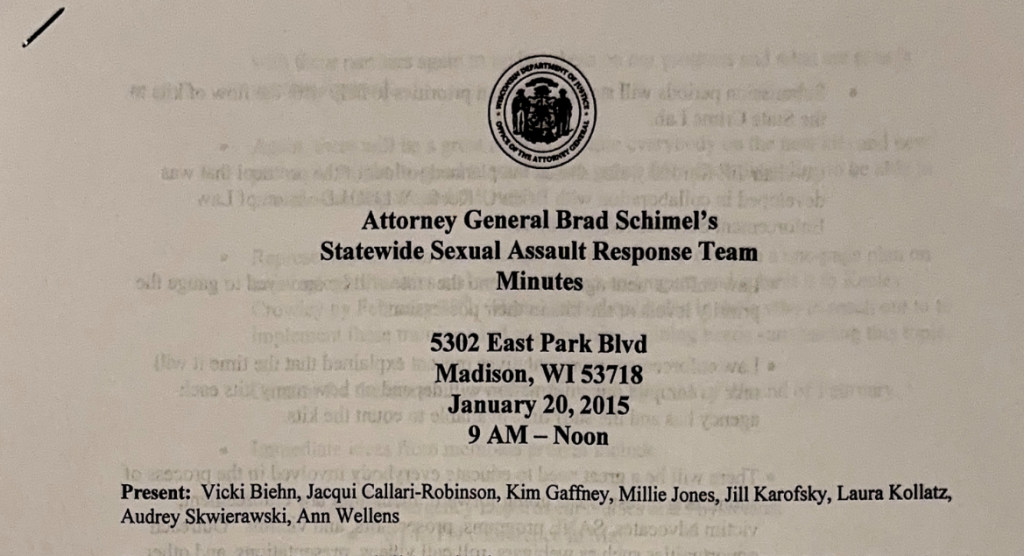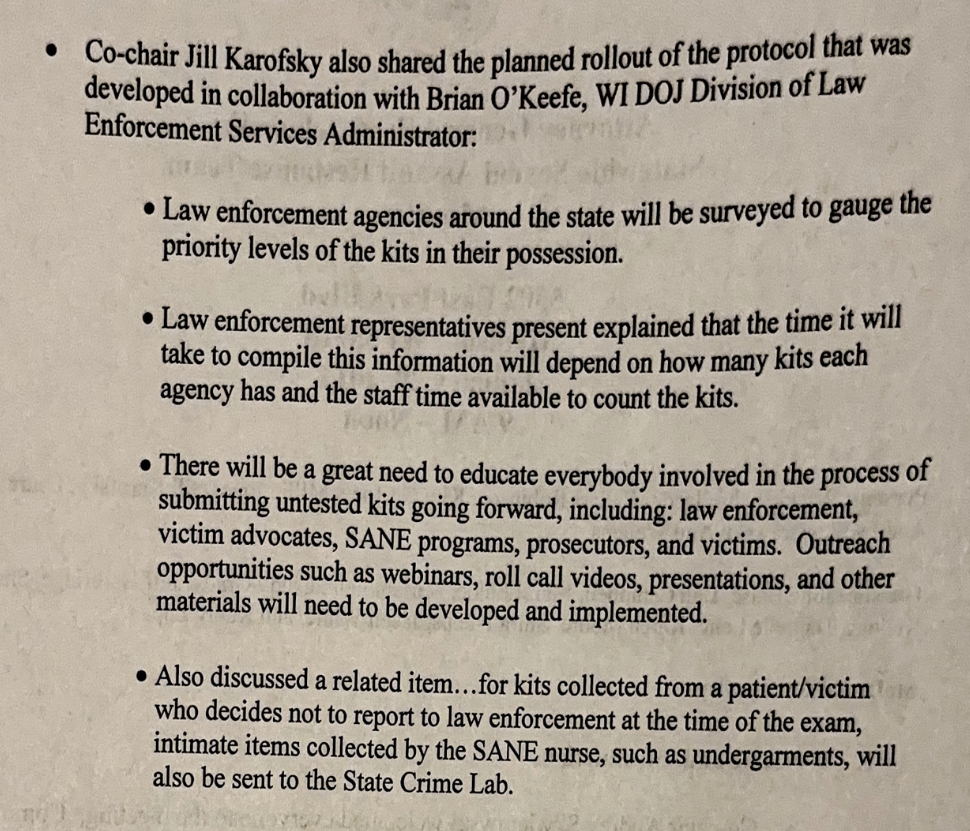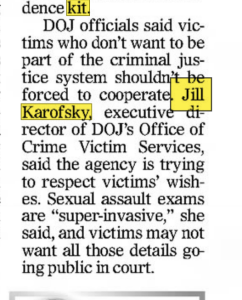In multiple newspaper articles at the time, Jill Karofsky adamantly defended the Schimel DOJ’s approach to the rape kits, saying it was the right thing to do for victims.
Liberal Supreme Court Justice Jill Karofsky was a key architect of Wisconsin’s rape kit backlog strategy, before and during Brad Schimel’s tenure as Attorney General, and she strongly defended it at the time as pro-victim, Wisconsin Right Now has extensively documented.
Wisconsin Right Now reviewed meeting minutes and Karofsky’s past comments in news articles from the time. They clearly prove that Karofsky played an integral role in determining how rape kits would be tested and how fast.
For example, in 2015, Karofsky played an active role in a meeting of newly elected Attorney General Brad Schimel’s Statewide Sexual Assault Response Team (SART). The team was developing protocols for clearing the rape kit backlog, but in a way that prioritized sensitivity to victims and obtaining their consent.
According to her resume, Karofsky served on the SART team from 2012 to 2017, almost the entire tenure of Schimel. Her resume also touts her supervisory role in the AG’s sexual assault efforts.
Karofsky, head of the AG’s Office of Crime Victim Services even before Schimel took office, was co-chair of the SART team, the minutes document. She was heavily involved in the effort even BEFORE Schimel became AG; he inherited a backlog that existed for years, scattered throughout the state on police agencies’ shelves, and fixed it.
The minutes do not document her expressing any concerns about how the AG was handling the rape kit protocol; on the contrary, the minutes show she was instrumental in DEVELOPING the protocol. News articles document that she repeatedly defended it.
Crawford is belatedly slamming Schimel, now a Waukesha County Judge, for not rushing the testing of the rape kits in which sexual assault survivors did not consent to the testing, suspects were already convicted or were acquitted, or the accusations were false, among other categories.
Crawford, a liberal, and Schimel, a conservative, are running against each other in the April 1 election for a seat on the state Supreme Court.
Crawford has bashed Schimel over the rape kit backlog. DAs and sheriffs throughout Wisconsin have praised Schimel for fixing the backlog without using taxpayer dollars. We’ve documented how Crawford’s weak sentences on child rapists and other violent offenders have resulted in some being quickly returned to the streets.
Crawford and the media are also ignoring the central role Karofsky played in developing Schimel’s ultimately successful rape kit testing strategy. But we’ve got the receipts.

The minutes from a January 20, 2015, meeting document how “Co-chair Jill Karofsky reviewed changes made to the protocol” involving the “priority levels for testing.” This section was called “prioritization protocol for collected sexual assault kits in Wisconsin.” The meeting minutes say that Schimel only briefly appeared at this meeting, joining it to thank the members, including Karofsky, for their work and emphasizing his commitment to it.
 Karofsky is also quoted in the minutes talking about the surveying of law enforcement agencies around Wisconsin “to gauge the priority levels of the kits in their possession.”
Karofsky is also quoted in the minutes talking about the surveying of law enforcement agencies around Wisconsin “to gauge the priority levels of the kits in their possession.”
Crawford shows ignorance of the realities when she states that Schimel’s AG office should have tested 6,000 kits, even those where victims didn’t want them tested or where the accusations were proven false, at warp speed.
Crawford is ignoring the fact that, first, the DOJ had to figure out how many law enforcement agencies even had kits and then find a way to get them tested that would not slow down crime lab testing of current cases, including those involving high-risk offenders.
Schimel eventually obtained outside grants and managed to clear the backlog, with the exception of cases in categories like those where victims would not consent. In so doing, he also maintained clearance levels of current cases that were far better in key categories than under his successor, Josh Kaul, while taking in many more current cases.
The minutes show that Karofsky shared a planned protocol rollout that involved a law enforcement survey, detailed the time it could take, stressed the need to educate stakeholders, and more.


Schimel has responded to Crawford’s attacks by saying he’s proud of his work to protect victims. He accused Crawford of lying to rape victims.
Jill Karofsky Defended Schimel’s Office
Karofsky’s role in fixing the rape kit backlog is also documented extensively in newspaper articles from the time.
The backlog predated Schimel, and minutes show Karofsky was also heavily involved in efforts to clear it under former AG JB Van Hollen. She was co-chair then, too. She even gave a national presentation on a consent form for rape victims before testing.
In 2014, while Van Hollen was still AG, an administrator in DOJ, Brian O’Keefe, sent a letter to police agencies about the SART team’s work on collecting information from police agencies on backlogged rape kits. Note that Karofsky was co-chair of SART at that time, but Schimel was not yet attorney general.



Karofsky told the Associated Press in 2014, even before Schimel took office, that victims’ “wishes and mental well-being must come first. We’re asking them to make a huge decision. We want them to be able to control the evidence.”
 In 2016, the year after Schimel took office, Karofsky told the Fond du Lac Reporter that the DOJ “won’t proceed” in sending untested kits to the lab if, in the words of the Reporter, “a victim doesn’t want their kit tested.” The Reporter said Karofsky rejected calls to test all kits, saying that the “wishes of individuals who may not want to proceed with criminal charges because of privacy, health or other reasons” were important.
In 2016, the year after Schimel took office, Karofsky told the Fond du Lac Reporter that the DOJ “won’t proceed” in sending untested kits to the lab if, in the words of the Reporter, “a victim doesn’t want their kit tested.” The Reporter said Karofsky rejected calls to test all kits, saying that the “wishes of individuals who may not want to proceed with criminal charges because of privacy, health or other reasons” were important.
But now Crawford is trashing Schimel for not testing all kits – in two years.
That begs the question: If Crawford believes that the handling of the 6,000 rape kits disqualifies Schimel to sit on the state Supreme Court, why does she believe it doesn’t disqualify Karofsky?

In multiple newspaper articles at the time, Karofsky adamantly defended the Schimel DOJ’s approach to the rape kits, saying it was the right thing to do for victims.
The DOJ would NOT test all kits, she told the media multiple times, because it was wrong to push forward in cases where victims did not consent. Some of her comments occurred during the two-year period that Crawford cites.
After all, such kits are “super-invasive,” Karofsky said at the time, and Schimel’s DOJ believed that rape victim survivors shouldn’t be “forced to cooperate.”
Why does Crawford?
In 2017, after Schimel had been in office for two years, Karofsky explained what Crawford is now labeling inexcusable “inaction” by saying: “We’re trying to be careful with the kits that we’re testing. We’re testing kits where we knew victims wanted to be a part of the criminal justice system, that they’re OK doing that,” Karofsky told The Capital Times on Feb. 1, 2017. “We don’t want to test kits where we’re unsure. We want the victims to come forward.”
The DOJ was launching a public awareness campaign “aimed at connecting sexual assault survivors with their untested kits,” the article says. Back then, the news media was sensitive to this concern.
The Damaging ‘Forklift’ Approach
Karofsky and Schimel were not alone in believing that genetic material from rapes should not be tested without a victim’s consent.
The Capital Times also quoted prosecutor Audrey Skwierawski, who is now director of state courts, a position she received from the liberal justices. “The ‘forklift’ approach what Skwierawski calls the indiscriminate mass testing of old kits, has the potential to blindside and retraumatize a victim who may have never wanted her kit tested and does not want to be a part of the criminal justice system,” the Capital Times noted.
Ian Henderson, director of legal and systems services at the Wisconsin Coalition Against Sexual Assault, “said a victim-centric approach is paramount,” the Capital Times reported.
Table of Contents












